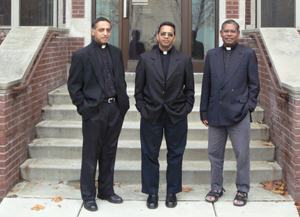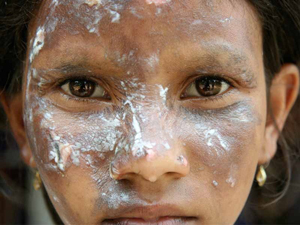
In June 1997, the priest, who expects to complete an interdisciplinary doctoral study in communication and education at Marquette this spring, escaped an attempt on his life in a small Indian village by hiding a motorbike in the forest and fleeing with pursuers on his tail. Fr. Tigga, a journalist, had been covering a political event that police feared would turn violent as the crowd grew.
Twice, during his work as a Jesuit journalist, Fr. Tigga’s life has been threatened, he explained in an interview with your Catholic Herald.
Life as a Marquette student is far calmer than the life he led in India, but Fr. Tigga and two fellow Jesuits, also Marquette students, keep a close eye on the escalating violence – especially against Christians – in their home country.
Fr. Francis Ezhakunnel, director of a leprosy eradication center, the Claver Social Welfare Center in Jamshedpur, Jharkhand, just north of Orissa, and Fr. Nicolas Santos, a university lecturer at St. Vincent College of Commerce in Pune, India, are studying at Marquette for advanced degrees. Fr. Ezhakunnel is a graduate student majoring in human resources management and Fr. Santos is an interdisciplinary doctoral student in marketing management and ethics. Both expect to graduate this spring.
They rattled off statistics during a recent interview at the Jesuit Residence on the Marquette campus with your Catholic Herald:
- In 1998, 92 homes of Christians were burned and one church burned;
- In 1999, a Catholic priest was killed and a Catholic nun was raped;
- In 2007 in December, 53 churches and nearly 500 homes of Christians were destroyed and five convents and seven schools were attacked;
- Last year alone, more than 4,000 homes of Christians were burned, 101 churches were destroyed or damaged, 14 convents and parishes were attacked, 55 were killed and more than 50,000 are homeless who are now living in the forest or in government-run relief camps.
The violence against Christians is increasing, they said, explaining that it’s being perpetrated by a small group of fundamentalist Hindus who are threatened by Christians. This extremist group feels threatened because the Christians empower Indians through education and health care.
“We do basic things like helping the poor, giving them education, health, hospitals. Those are very basic human tasks. That’s what we do, of course, and in the process when people get educated, they assert their rights and they get good jobs and improve their lives socially and economically and that’s what the upper Hindu caste doesn’t want,” said Fr. Tigga. “The upper Hindu caste wants to maintain the structure.”
The Jesuits pointed to attacks lasting seven weeks in Orissa in late August. The attacks occurred against Dalits, a group of people traditionally regarded as untouchables or people of a low caste, who had been forced to work as slave laborers on the lands of the upper Hindu caste.
“Now, after becoming Christians, they are educated and have very good jobs; some own small businesses, and because of that, the Hindus feel by becoming Christians, they have become out of their control so they want to bring them back under their control,” said Fr. Tigga, adding that because they are educated and have done well, the extremists seek to subdue them.
As a journalist and a priest, Fr. Tigga admitted he is in a more precarious situation than most. But the Jesuit said that won’t stop him from speaking out for the rights of the poor.
His journalism career began while he was working in a social work center to organize village communities and train them in agricultural practices. He noticed the newspapers favored the upper Hindu class, he said.

“No one seemed to be the voice of the poor or exploited,” he said, explaining he’d get angry because “justice was not done.”
Fr. Tigga tried to submit articles to local newspapers offering this perspective, but they were rejected, he said. Undeterred, he purchased journalism books and improved his writing skills. Eventually, his work, mostly editorials in which he took the side of the poor, was published.
Once his provincial realized he was interested in writing, he encouraged Fr. Tigga to study journalism. Shortly after his ordination in 1996, he was disturbed by a major article in an Indian newspaper where Christians were accused of coercing people to convert.
“The allegation was made against Christians that we give them education and help, food, that’s how we lure them and make them Christians,” he said. “I wrote a letter to the editor reacting to that question,” he said, explaining how his journalism career took off.
As he became more outspoken, however, the threats on his life occurred. A year later, he came to the United States to study and after he completes his degree, he expects to return to teaching communications at a Jesuit college.
“No, I’m not afraid (to return) but in the (Jesuit) society, we have a vow of obedience where we have to do what we are asked. It’s not that I don’t want to go back to that place, because I am afraid, but we have to do what the provincial tells us, and if he asks me to go back, I would be very happy,” said Fr. Tigga.
For now he stays in close contact with friends and family in India through phone and e-mail.
“I am in touch with the parish priest (Fr. Alex Ekka) in my place (the Church of St. Therese, Lureg in northeast Chattisgarh, along the border of Orissa and Chattisgarh) where people had to guard the churches around the clock for about three months,” he said. “I got an e-mail where he said the situation is very tense. Another told me there was an attack by local Hindus. The children were playing by the school and these leaders tried to bribe them by giving them money. This place is very close to my parents.”
Fortunately, he said, recent e-mails indicate the tension is subsiding, yet Catholics remain vigilant.
Fr. Tigga fears for his parents who live along the border of Orissa and Chattisgarh, the site of much of the violence.
“I think the one thing we can do is pray — pray for the Christians there and pray for the perpetrators for a change of heart,” he said.
The Jesuits also called on local political leaders to put pressure on the Indian government to contain the violence.
Stressing that it is only a small minority of fundamentalist Hindus perpetrating the violence, Fr. Ezhakunnel said the group is a small, but strong political party causing most of the trouble. He added that unfortunately they are funded in part by well meaning people who believe they are sending money to charities, but don’t realize their money is aiding the terrorist efforts.
Another way to provide help, said the Jesuits, is through financial assistance, as many of the tens of thousands in relief camps have lost everything. Money can be sent to them through Catholic Relief Services, <crs.org/India>.
